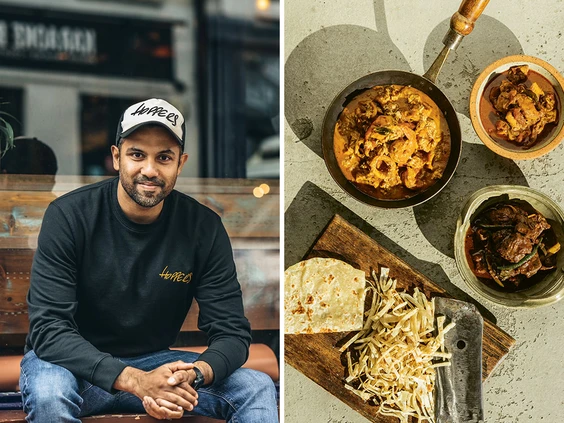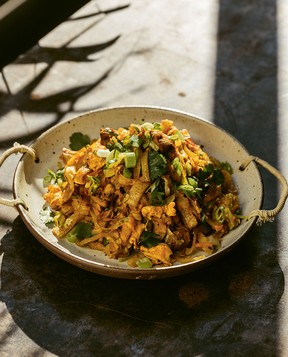Deep in the heart of Colombo’s Pettah Market, the clank of metal scrapers meeting flat-top grills points Karan Gokani in the right direction. The lawyer-turned-chef describes this melody as “the clickety clang of kothu.” He follows the cacophony of metal striking metal whenever he’s in search of a Sri Lankan street meal.

“It’s a very three-, four- or five- dimensional experience because it’s not just a dish. It’s not just where you sit and eat it, but it’s also the sound of it,” says the co-founder and creative director of Hoppers, a trio of restaurants in London specializing in the food of Sri Lanka and South India.
In Gokani’s cookbook debut, Hoppers, he devotes a chapter to kothus (also known as kottus or kothu rotis), “arguably the most popular street food in Sri Lanka.” The ultimate leftovers dish, it’s made by stir-frying shredded roti with vegetables, curry, eggs and fresh herbs.
Alongside chapters on essential curry powders, short eats and snacks, rice and breads, sambols, mallungs, chutneys and pickles, fries and curries, grills and roasts, desserts and drinks, Gokani highlights other quintessential dishes in a similar manner, distilling them to their key elements and offering variations on each one.
“Instead of doing a buriani recipe as one large recipe or a lamprais recipe as one large recipe or kothu as one large recipe, it was more ‘giving a man a rope, teaching him how to fish’ approach where I’ve actually explained what the item is, given a nice backstory, lots of visuals, and it spans a chapter as opposed to a recipe.
Gokani was born and raised in Mumbai, where he fell in love with the South Indian dishes prepared by his great-uncle Tatun, who grew up in the state of Tamil Nadu. In 2005, he moved to England to study law at Cambridge, where he made Sri Lankan friends who introduced him to their food culture.
He saw similarities with the South Indian food he loved but the differences made him curious to travel and learn more. What Gokani found was a multilayered cuisine influenced by the Tamil community, Sinhalese, Dutch burghers and Malay Muslims. He was hooked.
In 2012, Gokani left his career as a lawyer and returned to India, where he immersed himself in food and cooking. Back in England three years later, he opened the first Hoppers in Soho with his wife, Sunaina Sethi, and her brothers, Karam and Jyotin (the JKS Restaurants group).
“I basically opened the restaurant so I had an excuse to visit every time I could,” says Gokani. He and Sunaina now have two young children, and he usually travels to Sri Lanka twice a year. “At the bottom of it all (is) the love for a country. And especially at this time (of economic crisis), I’d love to see more people going there, because it makes sense for everyone.”
Hoppers is one of a few Sri Lankan cookbooks released by English-language publishing houses in recent years, such as Milk, Spice and Curry Leaves (2020) by Ruwanmali Samarakoon-Amunugama, who grew up in Port Coquitlam, B.C., and Rambutan (2022) by London-based chef Cynthia Shanmugalingam.
People elsewhere in the world are becoming more aware of the diverse food cultures of the Indian subcontinent, says Gokani. They’re travelling more and experiencing regional differences for themselves. With food being so popular on platforms such as TikTok and Instagram, they’re exposed to this diversity online, too.
“The knowledge is a lot deeper. It’s not just, ‘Let’s go for curry.’ It’s very specific. And I think Sri Lankan cuisine has kind of found itself and its little niche thanks to that, at least in the U.K.”

Hoppers, the restaurant, ended up being a “physical journal of things, and memories and places.” From the batik panels on the wall and the tiles on the floor to the dishes on the menu, every aspect of the restaurant was inspired by Gokani’s visits to Sri Lanka.
“Imagine going with your family, going with your friends, going by yourself on holiday to a country you love or a city you love over and over and over again over a long period of time. So, growing up going there every summer, say. And every time you go, you pick new memories, you pick new artifacts, new souvenirs and you bring them back and you adorn your house with it. You adorn your office with it. You write your little journal and stuff like that.
“Just the same way as a child would do that or someone growing up would do that with their favourite destination, I have been doing that with Sri Lanka. So, in a very physical sense, if you look at any of the artifacts displayed around our restaurants, I’ve usually brought them back from a holiday or have had a hand in picking them.”
In a similar way, Hoppers, the cookbook, turned into a scrapbook, of sorts. Writing it was like keeping a diary, says Gokani — an opportunity to share stories about his favourite people, places and recipes.
Even the layout is scrapbook-like, filled with photos by Ryan Wijayaratne, who has been documenting Gokani’s travels in Sri Lanka since 2019. QR codes pop up throughout the book, transporting readers to Sri Lanka with videos ranging from a meal at an arrack distillery in Chilaw to the clanging of cooks chopping kothu.
Gokani captured some of his favourite journeys in the book, such as his first trip to a toddy shop in Kerala more than 10 years ago (he can still remember almost every detail of the meal), stays at the Mount Lavinia Hotel, where he proposed to Sunaina, and a visit to Kumana National Park on the east coast of Sri Lanka, where he and his group ate rice packets filled with tuna ambul thiyal, which one of their rangers, Lasitha, had brought for a picnic lunch.
“It’s a very personal journey. It is sort of seeing Sri Lanka through our eyes. So, anyone who’s been to Hoppers understands, ‘OK, this is why Hoppers is what it is,’ and some interesting facts and interesting stories behind the recipes and artifacts and things. Someone who has not been to Hoppers gets a feel for what our purpose is.”
Hoppers is rooted in its namesake restaurants but isn’t confined by the cult-favourite spots. Some of the homestyle dishes have never appeared on the menu. The cucumber curry and pineapple curry recipes shared by the Hirdaramanis (“practically my Sri Lankan family”) and their housekeeper, Regina, for example, aren’t restaurant dishes, but they are perfect for home cooks.
From the beginning, Gokani saw an opportunity to write a cookbook that reached well beyond the restaurants and the people who eat there.
“This should be a way of getting into towns and cities and being able to travel with it. Being able to spread this love for Sri Lanka, which is effectively what we do. Above and beyond everything I do, there’s this undying passion for Sri Lanka, which I’ve always had, and that’s what I want to share.”
Source: https://nationalpost.com/life/food/karan-gokani-sri-lankan-recipes
